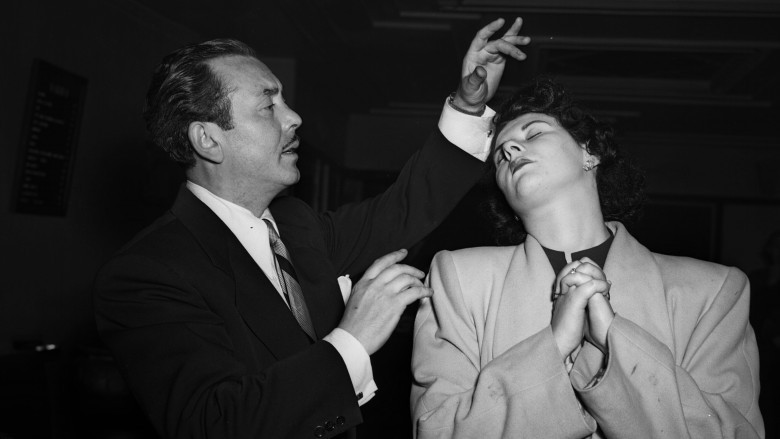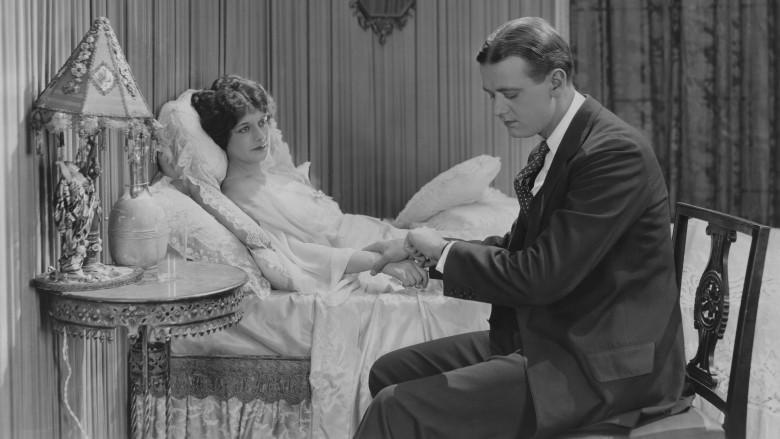The Untold Truth Of Hypnotism
Everyone knows of hypnotism because of four infamous words: "You're getting very sleepy." But aside from old Hollywood films and sideshow parlor tricks, hypnotism is viewed by many psychiatric professionals as a credible form of therapy when added to standard psychiatric care. Hypnosis isn't the illusion you think it is. However, while it has the ability to help people, it can be dangerous, and in some ways, it is a form of mind control.
Smoke and mirrors
So if hypnotism really isn't the smoke and mirrors you see on a circus stage somewhere, what is it? Well, it's very closely related to the practice of meditation. It relies on deep breathing exercises to put a person in a state of supreme relaxation and suggestibility. This psychiatric treatment doesn't involve a snickering man in a top hat and a cape waving a pocket watch in your face, but a trusted and licensed professional. The point is to get through to the patient while they are more open and accepting of the therapist's suggestions.
At the same time that a person feels sort of entranced by the process of hypnosis, they are also more focused and possess a higher level of concentration. When a person is in a trance-like state, all fades away except the professional's guiding voice. Think about it like removing the raging background noise of the city so you can better hear your friend in front of you. The key difference between hypnosis and meditation is that hypnosis uses the power of suggestion. In meditation, the goal is to get to a state of calm to become better in tune with yourself and the world around you. With hypnosis, a greater verbal component aims to alter your behavior for the better.
History of hypnotism
If you've seen any old westerns or perhaps even some horror movies, you'll know alcohol used to be an anesthetic for surgery. A couple hundred years ago, if you were going to get your leg chopped off, you wouldn't have the luxury of today's medicine—whiskey would have to do. But did you know that hypnotism was also on the list of anesthetics in the 1800s? Hypnosis was used to numb the pain to prevent patients from going into fatal shock. And it worked quite well.
Mind over matter may not have ever been better exemplified than by Scottish surgeon James Esdaile, who performed roughly 3,000 procedures in India using hypnosis with supreme success. According to neuroscientist Marjorie Woollacott, the death rates in surgery prior to the use of hypnotism were as high as 50 percent. However, when Dr. Esdaile started depending on hypnosis to numb his patients, the death rate dropped to a mere 5 percent.
Are you hypnotizable?
The issue with hypnotism is that it is very unpredictable. Some people can be hypnotized, while other people just can't. Hypnosis and its effectiveness is still largely mysterious to neuroscientists and psychiatric professionals alike. They know that it can work, but they're not so sure about the "why" part. A scientific study published in 2012 called "Functional Brain Basis of Hypnotizability" endeavored to learn why some people are more susceptible to hypnosis than others.
According to the study, what makes one person more hypnotizable than another depends on brain function and connectivity. According to the paper, people who are more easily hypnotized have stronger brain connections between the left dorsolateral prefrontal cortex—an "executive-control" region of the brain—and the parts of the brain devoted to processing info. Dr. Clifford N Lazarus over at Psychology Today also writes that in addition to possessing this trait of hypnotizability, a person must also be willing and open to the idea of hypnotism.
Everyone has their limits
Being able to hypnotize a person doesn't mean you can make them do anything you want them to do. You can only make suggestions to the hypnotized person about things that they could realistically do on their own. For example, you can't hypnotize a person who has never flown a plane before to lead a wartime air raid. A hypnotized patient is not a puppet. They still maintain a level of awareness.
You can, however, use hypnosis to bring about real change for a person. Hypnosis is common as an aid to quit smoking. It can also break a myriad bad habits or to alleviate pain, anxiety, or other uncomfortable physical sensations. The reason? Even physical sensations are ultimately all in the mind.
False memories
Hypnotism isn't the same thing as mind control because there are limitations to what it can do. However, hypnosis can have very strange effects. Most notably, it can implant or conjure up of false memories. Yup, hypnotism can make you remember events that never happened. This seems like some Orwellian science fiction, but be assured, it's completely real.
While many doctors use hypnosis so patients recall memories clouded by past trauma, the results are controversial. To provide some sort of solution to this issue, Dr. Joseph Green, a professor of psychology at Ohio State, co-authored a study to see how false memories were formed during hypnosis. 48 students were selected to participate. 32 were warned before undergoing hypnosis about possibly developing false memories, while the rest received no such a warning. Once under the influence of hypnosis, each student was asked to recall a night when they had gotten a full night's sleep and were asked if they had heard a loud noise at 4am that night. After hypnosis, many of the students now falsely recalled having heard such a noise—28 percent of those who had been warned of the dangers of false memories recalled the noise, and so did 44 percent of those who hadn't.
So it seems that warning a person about false memories prior to hypnosis helps prevent this confusion, but the risk is still there either way.
Mind-body connection
Neuroscientists and psychiatrists are on the case to figure out the ins and outs of hypnotism. Because hypnosis can numb pain, clearly some kind of link between the mind and the body needs to be explored. To test it out, scientists conducted experiments with hypnotized subjects and mapped the results in the brain.
In the late '90s, in an experiment that could be called torture, Pierre Rainville of the University of Montreal asked participants to place their hands in water that was 116 degrees Fahrenheit (that's hot enough to cause some pain but a little cooler than, say, pure hot water right out of your water heater). Some subjects were told the water would be painfully hot, while others were told they would feel little pain. When the hypnotized subjects placed their hands briefly in the water, their brains were scanned to see if there was some sort of internal physical event happening at the same time. "Those who had been told that the pain would be less intense showed less activity in their brains," NY Mag writes, "specifically, in the anterior cingulate cortex, which is associated with pain processing."
That's not the only experiment of its kind. In another study, hypnotized participants were told that the vibrant colors that they saw in certain paintings were just different shades of grey. Accordingly, their brain scans showed altered activity in the region of the brain that deals with color processing.
The dangers of hypnotism
Just as some people are not as hypnotizable as others, some people should not undergo hypnotherapy. Because hypnosis is a mental game of sorts, those with mental or psychiatric disorders should not be hypnotized.
According to the Cleveland Clinic, "Hypnotherapy might not be appropriate for a person who has psychotic symptoms, such as hallucinations and delusions, or for someone who is using drugs or alcohol." Because hypnosis alters the brain and a person's state of mind, those who already have mood disorders or problems clinging to reality can be hurt by the process. If you are suffering from a mental illness like bipolar disorder or schizophrenia, talk to your doctor about more standardized medical treatments before running straight to the nearest hypnotherapist.
Hypnobirthing
Because hypnosis can affect the way a person experiences pain, it's no wonder that people started pairing it with childbirth. Women go to all sorts of lengths to make their birthing experience less stressful and traumatic—water births, home births, etc. Even as children, we're made aware of just how much childbirth sucks. It's the most painful thing in the world, they say, and all you get out of it is a screaming, goop-covered little person. That's why more and more women have been turning to hypnobirthing to ease labor.
According to BabyCenter.com, "When a woman prepares for childbirth with hypnosis, these suggestions aim to replace fear and expectations of pain with confident expectations of a safe, gentle—even comfortable—birth." Instead of focusing on all of the negative information you've been told over and over again about the pain of childbirth, hypnosis can replace those ideas with more positive ones instead. Not only does it calm the mind, but women who have undergone hypnobirths have reported that it made the physical experience of giving birth far less painful and difficult.
Cosmopolitan writer Kristen Oganowski writes of her hypnobirth, "Hypnobirthing, I learned, is more about elevating endorphin levels, relaxing one's muscles, and developing self-soothing techniques to use during childbirth. In other words, hypnobirthing promotes control. It's just a deliberate, calm, and flexible sort of control." So maybe childbirth doesn't have to be the worst thing ever after all!
Self-control
You don't always have to be hypnotized at the hands of another. The reason hypnobirthing works for so many women is because it is a form of self-control—you can do it yourself. Self-hypnosis involves deep breathing and visualization exercises. You can learn to use hypnosis as a helpful coping mechanism for anxiety, pain, and addiction. How well it works depends on a variety of factors, like willingness and hypnotizability, but it can be a useful tool.
Men's Fitness has an easy to follow guide to self-hypnosis that you could try at home if you feel comfortable (and we're pretty sure you don't have to be either a man or fit to give it a try). Who knows, you could learn to not be so stressed out at work all the time. You could learn how to resist that extra piece of cake you want so badly. Whatever your reason, it's worth a shot!









